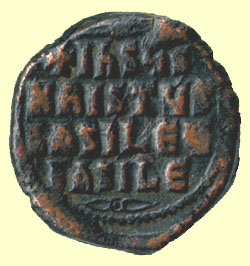 Contents -
Previous Article -
Next Article
Contents -
Previous Article -
Next Article
In The Secret History, Procopius describes life in the great city of Constantinople during the first half of the Sixth Century A. D. He describes the absolute power held by Justinian and Theodora, who is not only Justinian’s wife but holds imperial power as well. Procopius also writes about Belisarius and his wife Antonina. While most other sources paint a picture of the imperial couple as very capable and strong rulers, kind to their subjects on many occasions but capable of being utterly ruthless, Procopius paints Justinian and Theodora with in the blackest colors of infamy. He describes Justinian as treacherous and incapable of being faithful to any friend, bending or breaking his own laws to suit any purpose he might have. He describes Belisarius as a cowardly yes-man, totally at the mercy of his own wife and the imperial couple, who manipulate and abuse him until he is of no further use to him. Other historians describe Belisarius as a strong, intelligent leader of the Roman armies and a hero to the empire. Procopius saves his most bitter invective for the two women. He openly accuses both of them of being prostitutes and goes on to provide some quite graphic descriptions of the deeds he accuses them of. He tells us that both men are completely under in the power of their wives, afraid to displease them in any way.
The things Procopius describes in The Secret History come as a surprise to most students of history, since he writes very highly of Justinian in his other histories. Procopius wrote The History of the Vandal Wars, in which he relates how Belisarius defeated the last Vandal king in North Africa and retakes this old Roman province. for the empire. His History of the Gothic Wars tells a similar tale of Belisarius’ competent generalship in the retaking of Italy from the Ostrogoths. Procopius also wrote a book about the buildings erected by Justinian in the city of Constantinople and another about the wars against the Persians. Historians are still trying to guess why Procopius wrote so favorably about Justinian at first, then wrote the scandals in The Secret History, and then turned around and wrote glowing accounts of Justinian’s accomplishments again. Obviously, this work could not be published during the reign of Justinian and was only published after A. D. 535, the year in which both Justinian and Procopius died.
The writing style of this period in history is full of exaggeration and hyperbole. Procopius wrote in the Greek used by most educated people and writers of the late Roman Empire. The writing is filled with heroic sounding statements, lofty proclamations, and an incredible amount of flattering language in descriptions of those in power. An account written in this style was known as a panegyric. Other aspects of contemporary writing included language that totally vilifies anyone opposed to the writer’s point of view or who is perceived as an enemy of the person whom the writer is flattering in his account. There is also a tendency to be quite vague about actual events while very vividly painting either a saintly of a demonic picture of people. It is a style also used by the late Roman poet Claudian and others, and causes no small amount of confusion for modern historians.
Go to next article:
Go back to previous article: